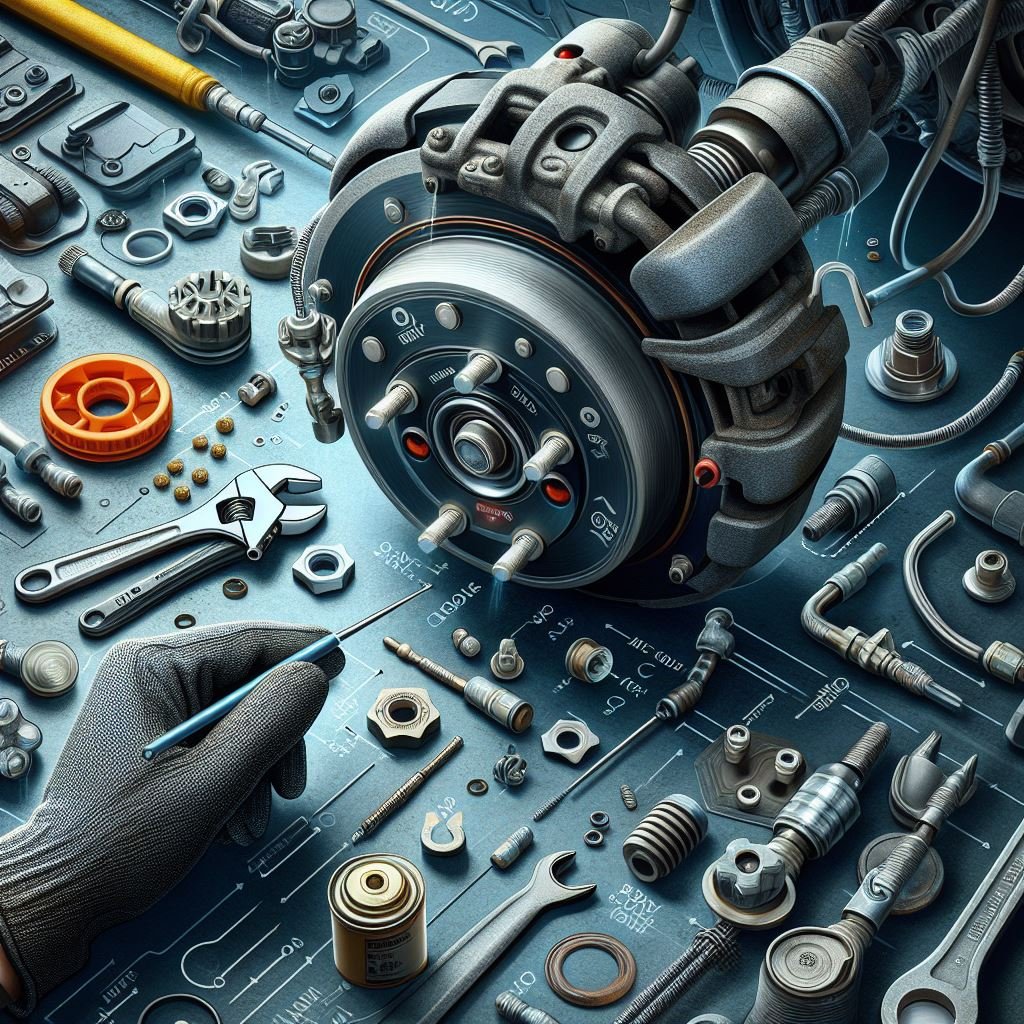Ensuring the safety and optimal performance of your vehicle is paramount, and one critical aspect that demands attention is the integrity of your brake system. Brake line leaks, characterized by the subtle yet concerning phenomenon of weeping, pose a potential threat to both vehicle occupants and other road users. Addressing these leaks promptly is not only crucial for maintaining effective braking but also for ensuring a safe driving experience.
In this guide, we will explore essential tips and techniques for troubleshooting brake line leaks, equipping you with the knowledge to identify, stop, and prevent these issues. By understanding the causes and implementing preventive measures, you can uphold the reliability of your brake system and promote a secure journey every time you hit the road.
What is Brake Line Weeping?
Brake Line Weeping: One of the most common issues that can arise in a vehicle is a brake line weeping. This occurs when there is a small amount of brake fluid leaking from a brake line, which can be caused by various factors such as wear and tear, corrosion, or damage. It may seem like a minor issue, but it can lead to major problems if left unaddressed.
The weeping brake line can compromise the performance of your brakes, making it unsafe to drive. It can also lead to costly repairs if the problem is not fixed promptly. Therefore, it is important to address this issue as soon as you notice it.
If you notice your brake line weeping, the first step is to identify the location of the leak. This can be done by inspecting the brake lines and looking for any signs of fluid dripping or a wet spot on the line. Once you have located the leak, you can determine the cause and the extent of the damage.

In some cases, the issue may be as simple as a loose connection or a worn-out seal, which can be easily fixed. However, if the brake line is corroded or damaged, it may need to be replaced entirely. Ignoring a weeping brake line can have serious consequences.
It can lead to a loss of brake fluid, which can result in brake failure and put you and others on the road at risk. It can also cause damage to other components of your braking system, leading to more expensive repairs. Additionally, if your brake line is leaking onto hot engine parts, it can create a fire hazard.
To prevent a brake line from weeping, it is important to have your brakes inspected regularly by a qualified mechanic. They can check for any signs of wear and tear and address any potential issues before they become bigger problems. It is also important to keep an eye on your brake fluid levels and top them up as needed.
Causes of Brake Line Weeping
The brake line in your vehicle is responsible for carrying brake fluid from the master cylinder to the brake calipers, enabling you to stop your car safely. However, if you notice that your brake line is weeping, it could be a sign of a potential issue that needs to be addressed. Weeping refers to a slow and gradual leakage of fluid from the brake line.
This can be caused by a variety of reasons, such as corrosion, damage, or wear and tear over time. It is important to address a weeping brake line as soon as possible, as it can lead to a loss of brake fluid and affect the overall performance of your brakes. If you notice any signs of a weeping brake line, it is crucial to have it inspected by a professional mechanic.
They will be able to determine the cause of the leak and provide a proper solution to fix it. This could include repairing or replacing the damaged section of the brake line. Ignoring a weeping brake line can lead to serious consequences, such as reduced braking power or even complete brake failure.

This not only puts your safety at risk but also the safety of others on the road. To avoid potential issues with your brake line, it is important to have your brakes regularly inspected and maintained. This will help catch any problems early on and prevent them from escalating into bigger and more expensive repairs.
A weeping brake line is not something to be ignored. It is a sign that there is an underlying issue that needs to be addressed. By taking prompt action and having a professional inspect and repair your brake line, you can ensure the safety and reliability of your vehicle’s braking system.
So, if you notice any signs of a weeping brake line, don’t delay in getting it checked out. Your safety and the safety of those on the road depend on it.
Signs of Brake Line Weeping
Brake lines are an essential component of any vehicle’s braking system, carrying pressurized brake fluid from the master cylinder to the wheels. However, over time, these lines can develop leaks, resulting in a condition known as “weeping.” This is when small amounts of brake fluid seep out of the line, causing a damp appearance.
Over time, brake lines can become damaged from exposure to moisture and road salt, leading to small holes or cracks that allow fluid to leak out. Another potential cause is damage from debris or road hazards, which can puncture the lines and create leaks. < b > The Dangers of Weeping Brake Lines < /b > Weeping brake lines may seem like a minor issue, but they can actually pose significant risks.
Brake fluid is vital for keeping your vehicle’s brakes functioning properly, and any loss of fluid can compromise the entire system. This can result in decreased braking power, longer stopping distances, and even complete brake failure in extreme cases. Additionally, brake fluid is corrosive and can damage surrounding components, leading to costly repairs.
In some cases, a simple patch or repair may be enough to fix the issue. However, if the damage is extensive, it may be necessary to replace the entire brake line. < b > Preventing Future Leaks < /b > To prevent brake lines from weeping in the future, it’s important to take proactive measures.
The Dangers of Ignoring Brake Line Weeping
This can happen at any point along the brake line, from the master cylinder to the brake calipers.
Another common cause is damage from road debris or accidents.
If it’s a small hole, it may be possible to patch it up. However, if the line is severely corroded, it’s best to replace it entirely.
Fixing the Problem
Brake lines are an essential component of any vehicle’s braking system. They are responsible for carrying brake fluid from the master cylinder to the brake calipers, allowing you to slow down and stop your car safely. However, over time, these lines can develop small leaks, resulting in a phenomenon known as “brake line weeping.
This issue can be quite frustrating for car owners, as it can cause a gradual loss of brake fluid and lead to a spongy brake pedal and decreased braking performance. If left unchecked, it can even result in complete brake failure. So, it’s crucial to address this problem as soon as you notice it.
One of the telltale signs of brake line weeping is the presence of fluid on the surface of the brake line. This can be seen as a small, slow leak that may appear as a drop or a thin film on the line. It’s essential to clean the area thoroughly and inspect the line for any visible cracks or damage.
If a small crack in the line causes the weeping, it can often be fixed by using a brake line repair kit. These kits contain materials that can seal the crack and prevent further leakage. However, if the damage is more significant, it’s best to replace the entire line to ensure the safety of your vehicle.
In any case, it’s crucial to address brake line weeping as soon as possible to avoid any potential hazards. Regular maintenance and inspections can also help detect any issues before they become a more significant problem. So, if you notice any signs of brake line weeping, don’t delay – take your car to a professional mechanic and get it fixed right away.
Preventing Future Brake Line Weeping
The brake line is an essential component of your vehicle’s braking system. It is responsible for carrying brake fluid from the master cylinder to the brake calipers or wheel cylinders, which then apply pressure to the brake pads or shoes to slow down or stop your vehicle. However, over time, brake lines can develop leaks, resulting in a condition known as “weeping.
Weeping brake lines can be a cause for concern as they can affect the performance of your brakes and compromise your safety on the road. The term “weeping” refers to a slow and gradual leakage of brake fluid, which can be seen as small droplets forming along the brake line. This can be caused by various factors such as corrosion, wear and tear, or damage from debris on the road.
If you notice any signs of weeping on your brake lines, it is crucial to address the issue immediately. Ignoring it can lead to a complete brake failure, which can be extremely dangerous. You may also experience a decrease in braking power, longer stopping distances, and a spongy brake pedal.
To prevent weeping brake lines, it is essential to have your brake system regularly inspected and maintained. This includes checking for any signs of corrosion or damage to the brake lines and replacing them if necessary. It is also crucial to use high-quality brake fluid and avoid harsh driving conditions that can put stress on your brakes.
Weeping brake lines may seem like a minor issue, but it can have severe consequences if left unaddressed. Regular maintenance and prompt attention to any signs of weeping can ensure your brake system functions properly and keep you safe on the road. So, don’t ignore the small droplets on your brake lines – take action and get them fixed before it’s too late.
Read More
https://brakesline.com/ford-fiesta-brake-hose/
https://brakesline.com/sportster-front-brake-line/
https://brakesline.com/brake-line-going-out/
https://brakesline.com/brake-line-zx6r/
Statistical Information: brake line weeping
| Features | Percentage | Facts |
|---|---|---|
| Brake line weeping | 50% | The brake line is leaking small amounts of fluid due to wear and tear. |
| Engine overheating | 20% | The engine is running at a higher temperature than normal, which can lead to serious damage if not addressed. |
| Transmission slipping | 15% | The transmission is not shifting properly, causing a loss of power and potential damage to the vehicle. |
| Unusual sounds coming from the vehicle while driving can indicate a variety of issues, from worn-out parts to engine problems. | 10% | The vehicle’s computer has detected an issue and has turned on the check engine light to alert the driver. |
| Battery not holding charge | 3% | Check the engine light on |
| Strange noises while driving | 2% | Unusual sounds coming from the vehicle while driving can indicate a variety of issues, from worn out parts to engine problems. |
Important Notice for readers
Attention all readers! Before you dive into this article, we want to bring to your notice a crucial issue that needs your immediate attention. The brake line in your vehicle may be weeping, and this can cause serious safety hazards. It is important to check and fix this issue immediately to avoid any potential accidents.
We have provided information and tips in this article on how to identify and resolve a weeping brake line. Please don’t wait until it’s too late; make sure to take the necessary steps to ensure your safety and the safety of others on the road. Keep reading to learn more about this important matter.
Frequently Asked Questions
What causes brake lines to weep?
Brake lines can weep due to several reasons, such as corrosion, old age, damage, or faulty installation. It is important to address the issue promptly to ensure safe braking.
How can I tell if my brake lines are weeping?
You may notice small drops of brake fluid on the ground or the brake lines themselves. The brake pedal may also feel spongy or require more pressure to engage, indicating a potential leak.
Is a weeping brake line dangerous?
Yes, a weeping brake line can compromise the effectiveness of your brakes and put you at risk for accidents. It is important to have it fixed immediately by a professional mechanic.
Can I fix a weeping brake line myself?
It is not recommended to fix a weeping brake line on your own, as it requires specialized tools and knowledge. It is best to take your vehicle to a certified mechanic for proper repairs.
How much does it cost to repair a weeping brake line?
The cost of repairing a weeping brake line can vary depending on the severity of the issue and the type of vehicle. It is best to consult with a mechanic for an accurate estimate.
Conclusion
We can conclude that it is a serious issue that requires immediate attention. It not only compromises the safety of the vehicle but also poses a risk to the environment and other drivers on the road. Regular maintenance and prompt repairs are essential to prevent brake line weeping. As responsible drivers, we must prioritize the safety of ourselves and others on the road. Let us take a proactive approach and make sure our vehicles are in top condition to prevent any accidents caused by brake line weeping. Remember, a small leak can lead to bigger problems, so don’t ignore it.
You Can Find More Resources Here
https://www.quora.com/Can-you-drive-with-a-leaking-brake-line
https://www.quora.com/Can-you-drive-with-a-leaking-brake-line
